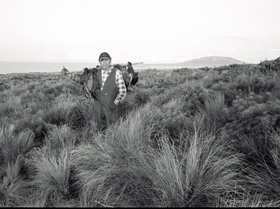Two solo shows
dal 14/7/2009 al 14/7/2009
Segnalato da
14/7/2009
Two solo shows
Stills Gallery, Sydney
Ricky Maynard's work is significant within an Indigenous history of Australia as was well established in the Tasmanian episode of the TV series First Australians. Anne Ferran works with the residues of Australian colonial history, particularly of women and children, closely examining the often-meagre evidence of their lives.

Ricky Maynard
This year the work of Ricky Maynard is commemorated in Portraits of a Distant Land, a retrospective of his photographic work to date at the Museum of Contemporary Art in Sydney (4 June - 23 August, 2009). A monograph has been published to accompany the exhibition. Maynard's work is significant within an Indigenous history of Australia as was well established in the Tasmanian episode of the recent TV series First Australians.
Maynard is a documentary photographer based on Flinders Island in the Bass Strait between North East Tasmania and the mainland of Australia. His extended family escaped extinction in Tasmania in the mid to late 1800's belying the widely held belief that all Tasmanian Aboriginals were killed. They did so by resettling on Cape Barren Island in the Bass Strait and subsequently moving to Flinders Island where there is currently a population of approximately 1000 people.
His chosen medium of documentary photography is significant and an appropriate tool, associated historically with telling stories of oppressed people. When Maynard learned his craft, working in the darkroom at AIATSIS in Canberra in the mid to late 80's, he saw the way Aboriginal people had been portrayed to date. He later studied at the International Centre of Photography in New York coming into contact with racism of a different nature in Spanish Harlem. He decided he wanted to present Indigenous people in a different light, feeling strongly that they should not see themselves as victims.
The six series he has produced in over 20 years of practice more than achieve this goal. Maynard is an expert black and white craftsman who says "I seek a balance between craftsmanship and social relevance". He has been a passionate spokesperson for documentary photography. Throughout his work he addresses "issues of identity, site, place and nation".
At Stills Gallery we will feature portraits of Wik elders from Returning To Places That Name Us (shown at Stills Gallery in 2000) and Portraits of a Distant Land (2005-2009) Maynard's most recent and ongoing series. It documents the "physical and social landscape of his people through songlines, corner stones, petroglyphs, massacre sites, middens, meeting places, sacred sites and cultural practices, in a combination of visual diary and oral history." (Keith Munro, Culture Warriors catalogue). "This work has a very clear intent - of re-claiming our own" (Ricky Maynard).
Stills Gallery represents the work of Ricky Maynard and his earlier series No more Than What You See (1993) and Urban Diary (1997) are available to view. Maynard's work has been seen widely internationally since 2007, with Ricky Maynard 1986-2007 at the Australian Embassy in Paris for the Musée du Quai Branly, and Portraits of a Distant Land touring to New Caledonia, Vanuatu and New Zealand.
.............................
Anne Ferran works with the residues of Australian colonial history, particularly of women and children, closely examining the often-meagre evidence of their lives. Lost To Worlds 2008 is the culmination of more than a decade's exploration by the artist of the same piece of ground, a paddock on the outskirts of the small village of Ross in central Tasmania. In the mid 19th century this was the site of a female factory or female convict prison, a place of secondary punishment for women who re-offended after arriving in the colony. Today little remains of that past apart from some mounds of earth and scattered stones.
"Ferran's practice... focusing on incidental details and overlooked subjects, combining the indexical authority of the photograph with the sensorial resonance of symbolic objects and materials, brings history up against itself, up against its desire to differentiate itself from the now. Ferran's work instead insists on confronting us with the past's tenacious persistence."
Geoffrey Batchen The ground, the air catalogue 2008
Ferran's first exhibition of photographs from this site was in 2001. Some of those earlier images are reprised Lost to Worlds 2008, now a body of 30 large photographs digitally printed onto aluminium. The gallery audience effectively sets the work in motion, the play of light across the metal surfaces simultaneously reflecting their passage and clouding their view. The photographs offer occasional glimpses of sky or horizon but for the most part the view is resolutely towards the ground. Presented with few clues or meaningful facts to hold onto, our expectations of photography are confounded in much the same way as the bare ground confounds an understanding of this place's history.
These photographs collectively reflect the ongoing difficulty of grasping and making sense of a ruined and fragmented past. Lost to Worlds 2008 asks the question: how is it possible for a place to release what it knows?
Anne Ferran is one of Australia's foremost photo artists. She has exhibited widely both in Australia and overseas. Her work is held in most major Australian public collections including those at the National Gallery of Australia, National Gallery of Victoria, Monash University, Art Gallery of South Australia, Queensland Art Gallery and the Art Gallery of NSW. It is also in the collection of the International Museum of Photography in Rochester, New York. She currently lectures in the Photomedia Studio of Sydney College of the Arts, University of Sydney.
Image: Ricky Maynard
Opening Sat 18 July 3-5pm
Stills Gallery
36 Gosbell Street Paddington - Sydney
Opening hours: Tues-Sat 11am-6pm
Free admission



